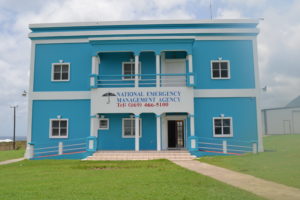Residents and businesses are reminded to vigorously prepare for the 2018 Atlantic Hurricane Season, which begins today.
Already Alberto, a subtropical system that preceded the current Hurricane Season by a week, has impacted Florida, along the American Panhandle through the Gulf of Mexico and as far inland as Alabama in the Southern States. But does this mean that the season will be exceptionally severe?
Forecasters say no. What they urge individuals and disaster managers to do however, is to follow updated information from the relevant authorities in order to make critical decisions at a moment’s notice. Experts remind us that although Forecasters can predict how busy a season will be; how many storms will impact land and where, remains a mystery to them.
In an interview on From Danger to Safety, NEMA’s programme which airs on ZIZ Radio weekly (Thursdays at 6pm and rebroadcast on Sundays, at 3:30pm), the Senior Officer at St. Kitts Meteorological Services Elmo Burke has advised that 14 storms and 7 hurricanes are forecast.
“Predictions suggest the potential for 3 major hurricanes,” he said, “however, we must be reminded that even in that eventuality, developing systems will not necessarily impact us here in St. Kitts-Nevis.”
The key message for communities, businesses and residents is to be prepared period.
“This cannot be overstated,” said Deputy Disaster Coordinator (DNDC), Claricia Langley-Stevens. “Persons ought to do whatever is possible to minimise impacts now, before a disaster happens, thus reducing challenges to your recovery process.”
According to the DNDC, the need to manage disasters through preparedness doesn’t change from season to season nor even from hazard to hazard. She says that she continues to urge everyone to prepare for impact, even if we dodge all of the systems in the end.
Prepare By doing the following:
1. Check your roofs, walls, structure for vulnerabilities and begin to collect non-perishable goods, portable lights such as flash lights, batteries and clean receptacles for water storage;
2. Store additional medicines at home for long-term illnesses and other supplies in the event that you have to stay indoors for long periods, or that businesses such as pharmacies are impacted and remain closed;
3. Turn off all electronic equipment at the source during an event; Turn your refrigerator to the coldest setting leading into an impact;
4. Share emergency numbers with all members of your household and create a family plan to identify important activities such as where to reconnect after impact, if you are separated;
5. Keep a transistor or other portable radio device on hand to receive alerts and updates from the relevant authorities;
6. Remain indoors during and after an event, until the ALL CLEAR has been given by the Authorities.
For more information, contact NEMA at 466-5100 or log onto www.nema.kn or NEMA SKN on Facebook.
Vesta I. Southwell
Public Relations Officer
1st June, 2018
